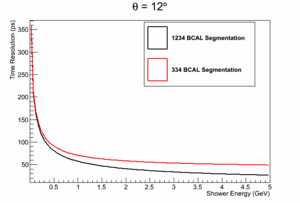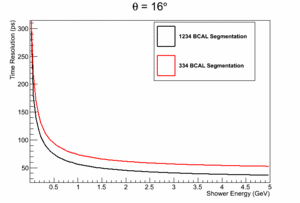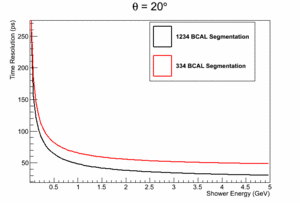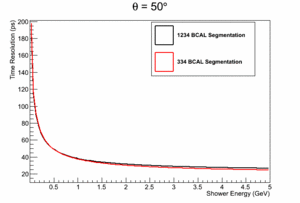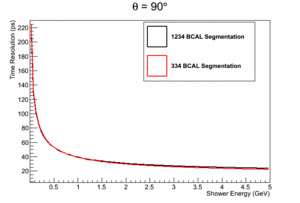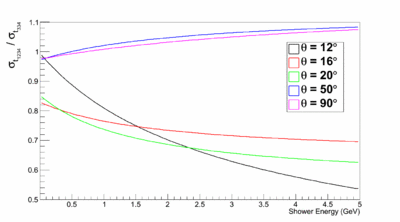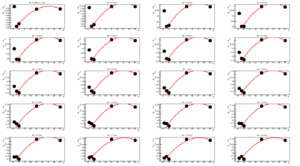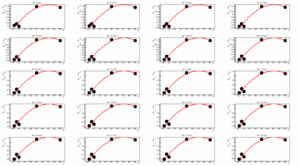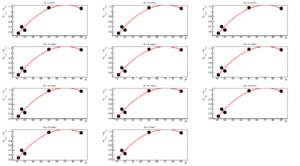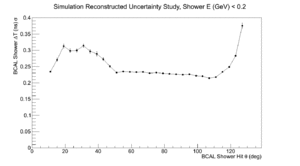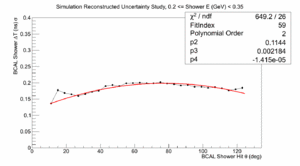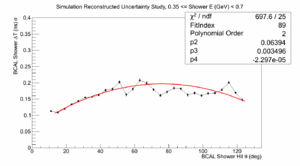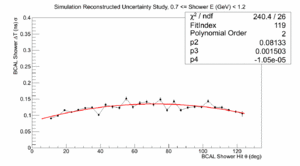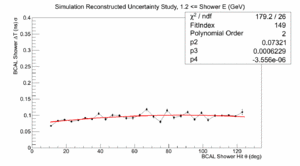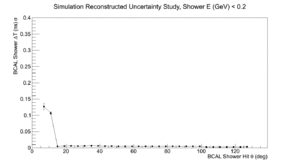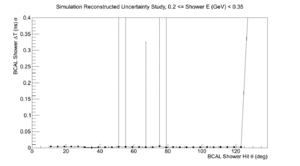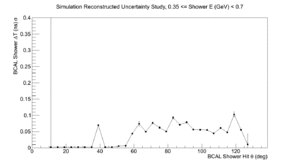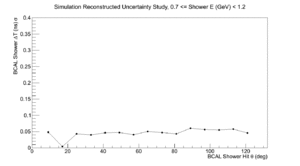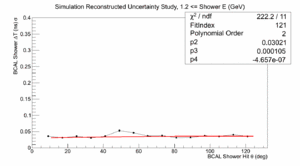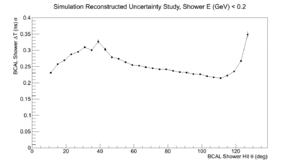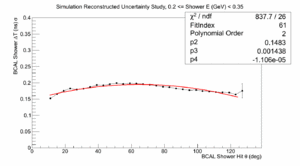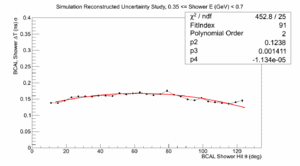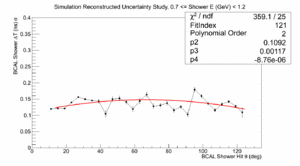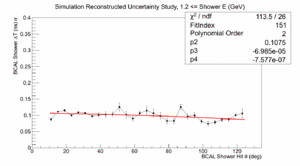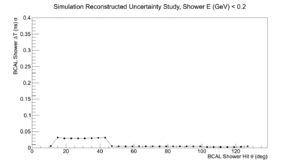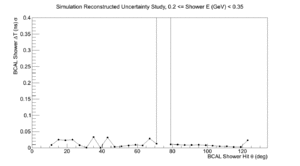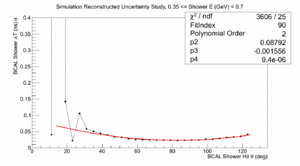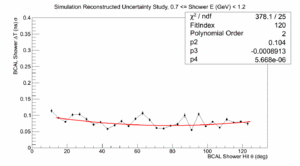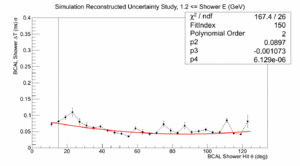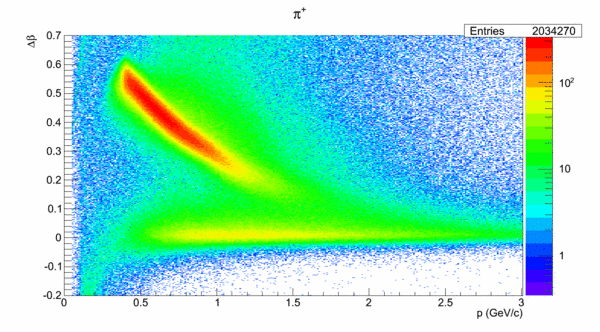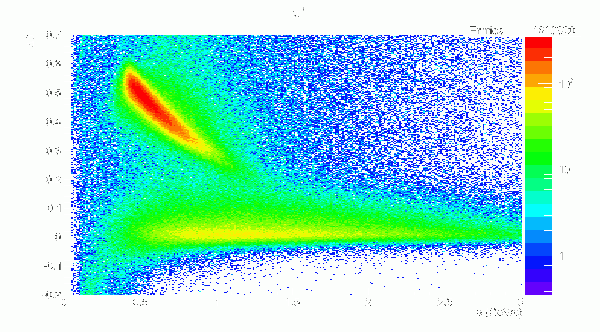Mattione Update 10312011
From GlueXWiki
Contents
Procedure
- Reconstruct π(1600) -> b1π events with t-slope = 2.0 (was 5.0 for X(2000)) using both the 334 and 1234 segmentations
- Plot Δβ vs p for π+ candidates to see proton, π+ separation.
1234 Segmentation BCAL Time-Smear Details
- The 1234 segmentation is not available in the HDGEANT simulation, so its BCAL shower time was smeared manually during reconstruction
- The BCAL hit-time smear was disabled in mc_smear
- The shower time was smeared by: σsmear = sqrt(σ2t_1234_Target - σ2t_334_NoSmear), where σt_1234_Target = σt_334*Improvement_Ratio, Improvement_Ratio = σt_1234 / σt_334
- These time uncertainties were studied as a function of dE and θ
- The σt_1234 / σt_334 improvement ratio was obtained from fitting the results of David Lawrence's studies of photons
- The σ2t_334 and σ2t_334_NoSmear variances were determined separately for protons and pions, by comparing the reconstructed shower times to their true values.
Improvements from last week's study
- Looking at π(1600) -> b1π events with t-slope = 2.0 instead of π(2000) -> b1π events with t-slope = 5.0: Higher proton momentum in BCAL for studying separation
- The σt_334_NoSmear resolution is no longer assumed to be zero: it is non-negligible for large energy deposits (presumably due to clustering?)
- The σt_334 resolution is determined separately for protons and pions (was using the pion resolution for both previously)
- Better fit to photon σt_1234 / σt_334 distributions due to extra data point at 50 degrees
- Low-θ, low-dE time resolutions better-simulated: instead of extrapolating fit, performing linear-interpolation between data-points.
- 2 (presumably canceling) bug fixes, final results on hold until confirmation (tomorrow possibly?).
NOTES
- The photon σt_1234 / σt_334 is assumed to be applicable to protons and pions
David's BCAL Photon Time Resolution Studies
- γ BCAL σt vs. dE (GeV):
Time Resolution Segmentation Ratio
- γ BCAL σt_1234 / σt_334 vs. dE (GeV):
- NOTE: When applying this "Improvement Ratio," the maximum allowed value was set to 1 (shouldn't be worse for 1234 at large angles, right?)
- Fits to γ BCAL σt_1234 / σt_334 vs. θ in dE bins:
- Don't trust fits at low-θ, so linearly-interpolate between 12 and 16 degrees.
BCAL π- & proton 334 Segmentation σt Fits
- When the BCAL time-smear is enabled, the π- & proton time resolutions are similar.
- When the BCAL time-smear is disabled, the π- & proton time resolutions are similar, except at high shower energies.
BCAL π- 334 Segmentation σt Fits
- BCAL π- 334 Segmentation σt Fits vs. θ in dE bins:
- NOTE: For the first dE bin, the values were linearly interpolated between the points instead of fit to a function.
- Last week, the fit was extrapolated from high-θ over the low-θ range.
- NOTE: For the first dE bin, the values were linearly interpolated between the points instead of fit to a function.
BCAL π- 334 Segmentation σt Fits with BCAL Time Smear Disabled
- BCAL π- 334 Segmentation σt Fits with BCAL Time Smear Disabled vs. θ in dE bins:
- NOTE: These resolutions are negligible except at high dE.
- NOTE: The bad fit results were ignored.
- NOTE: For the first two dE bins, the time smear was set to zero.
- NOTE: For the third and forth dE bins, the values were linearly interpolated between the points instead of fit to a function.
BCAL Proton 334 Segmentation σt Fits
- BCAL proton 334 Segmentation σt Fits vs. θ in dE bins:
- NOTE: For the first dE bin, the values were linearly interpolated between the points instead of fit to a function.
- Last week, the π- fit was used, and was extrapolated from high-θ over the low-θ range.
- NOTE: For the first dE bin, the values were linearly interpolated between the points instead of fit to a function.
BCAL Proton 334 Segmentation σt Fits with BCAL Time Smear Disabled
- BCAL proton 334 Segmentation σt Fits vs. θ in dE bins:
- NOTE: These resolutions are negligible except at high dE.
- NOTE: The bad fit results were ignored.
- NOTE: For the first dE bin, the values were linearly interpolated between the points instead of fit to a function.
- NOTE: For the second dE bin, for θ <= 27.0, the values were linearly interpolated between the points. For θ > 27.0, the time resolution was set to zero.
π(2000) vs π(1600) b1pi Events, π+ BCAL Δβ vs p
Δβ = βp - βt = p/sqrt(p*p + m*m) - path/(c*TOF)
- b1pi Events, π+ BCAL Δβ vs p, 334 Segmentation:
